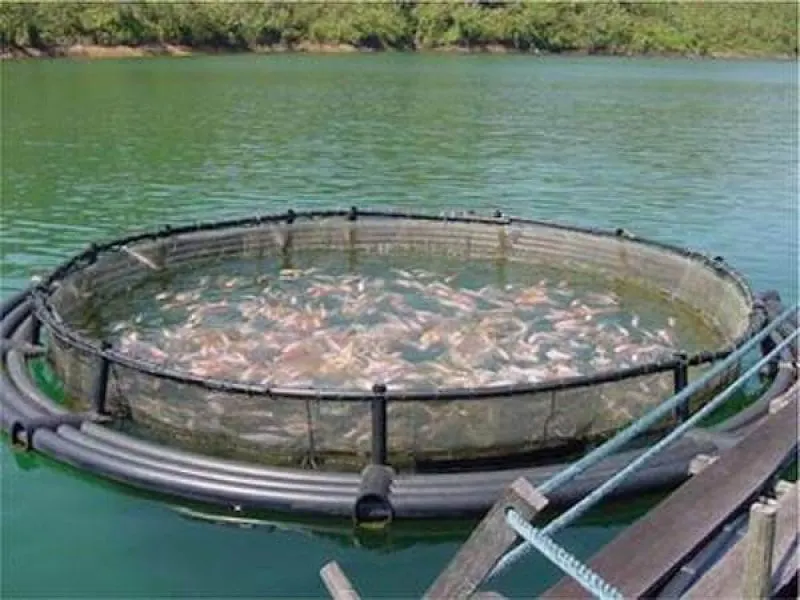CRISPR could speed growth and increase disease resistance in farmed fish, boosting aquaculture sustainability
CRISPR could speed growth and increase disease resistance in farmed fish, boosting aquaculture sustainability


The potential of fish and shellfish production to feed a growing global population could be significantly enhanced through advances in genetics and biotechnology, researchers have said.
Many species of fish and shellfish have been domesticated relatively recently compared with most livestock species, and so have diverse gene pools with major potential for selective breeding, according to the review paper in Nature Reviews Genetics.
The development of tools to gain insight into the genetics of these species, and apply such tools for breeding and management, provides opportunities to release that potential, researchers say.
Most aquaculture species can produce many offspring, and large populations with improved genetics can be bred quickly for improved production performance.
The benefits may include improved growth, resistance to disease or robustness in diverse farming environments.
Farmed fish is on course to overcome wild fish as the main source of seafood, and consequently genetic tools and expertise are in high demand to increase the efficiency and sustainability of aquaculture systems, which currently rely mostly on unselected stocks.
Insight into the genomes of species can enable careful selection of a farming population with desirable traits, and monitoring genomic variation will help maintain genetic diversity as farm populations develop.
In the future, technologies such as genome editing could be used to introduce desirable traits, such as disease resistance, into farmed species, and surrogate breeding could be employed to support production of preferred species.
The review paper, collaboration between experts from Universities of Edinburgh, Exeter, Stirling, and Aberdeen, is an output of the AquaLeap consortium project.
AquaLeap is funded by the Biotechnology and Biological Sciences Research Council, the Natural Environment Research Council and the Scottish Aquaculture Innovation Centre, in partnership with the Centre for Environment, Fisheries and Aquaculture Science, Hendrix Genetics, Xelect, The National Lobster Hatchery, Tethys oysters, and Otter Ferry SeaFish.
Environmental Biologist Dr Eduarda Santos, from the University of Exeter and co-author of the study said: “The rapid expansion of aquaculture has contributed to increased food security across the globe, however, issues related to domestication of desired species and emergence of diseases, limit its further development.
“Genomics has the potential to offer solutions to many of these limitations by improving our knowledge of the genomes of cultured organisms, genetic selection, and better understanding of the dynamic interactions between genes and the environment, to maximise food production.”
Dr Jamie Stevens, also from the University of Exeter and co-author added: “We only have to look at the example of Atlantic salmon to see the immense value of a sequenced genome to the relatively recent optimisation of a wild species for the aquaculture market.
“Similarly, we anticipate the delivery of a genome for other species, including the European lobster, will offer similar opportunities to develop molecular tools with which to rapidly increase the potential of lobster as an aquaculture species and improve the sustainability of its wild populations.”
Professor Ross Houston, the Roslin Institute: “There is a timely opportunity to harness the potential of farmed aquatic species, to ensure food security for a growing population. Genomic selection and biotechnology can speed up this process, and recent developments in these fields will soon be translated to benefit aquaculture production for many of these species across the world.”
Read the original post

 | Videos | More... |

Video: Nuclear energy will destroy us? Global warming is an existential threat? Chemicals are massacring bees? Donate to the Green Industrial Complex!
 | Bees & Pollinators | More... |

GLP podcast: Science journalism is a mess. Here’s how to fix it

Mosquito massacre: Can we safely tackle malaria with a CRISPR gene drive?

Are we facing an ‘Insect Apocalypse’ caused by ‘intensive, industrial’ farming and agricultural chemicals? The media say yes; Science says ‘no’
 | Infographics | More... |

Infographic: Global regulatory and health research agencies on whether glyphosate causes cancer
 | GMO FAQs | More... |

Why is there controversy over GMO foods but not GMO drugs?

How are GMOs labeled around the world?

How does genetic engineering differ from conventional breeding?
 | GLP Profiles | More... |

Alex Jones: Right-wing conspiracy theorist stokes fear of GMOs, pesticides to sell ‘health supplements’




 California, Washington, Oregon forge immunization alliance to safeguard vaccine access against federal undermining
California, Washington, Oregon forge immunization alliance to safeguard vaccine access against federal undermining Fighting deforestation with CO2: Biotechnology breakthrough creates sustainable palm oil alternative for cosmetics
Fighting deforestation with CO2: Biotechnology breakthrough creates sustainable palm oil alternative for cosmetics Trust issues: What happens when therapists use ChatGPT?
Trust issues: What happens when therapists use ChatGPT? Viewpoint — Fact checking MAHA mythmakers: How wellness influencers and RFK, Jr. undermine American science and health
Viewpoint — Fact checking MAHA mythmakers: How wellness influencers and RFK, Jr. undermine American science and health 30-year-old tomato line shows genetic resistance to devastating virus
30-year-old tomato line shows genetic resistance to devastating virus The free-range chicken dilemma: Better for birds, but with substantial costs
The free-range chicken dilemma: Better for birds, but with substantial costs Viewpoint: Video — Big Solar is gobbling up productive agricultural land and hurting farmers yet providing little energy or sustainabilty gains
Viewpoint: Video — Big Solar is gobbling up productive agricultural land and hurting farmers yet providing little energy or sustainabilty gains ‘You have to treat the brain first’:Rethinking chronic pain with Sanjay Gupta
‘You have to treat the brain first’:Rethinking chronic pain with Sanjay Gupta
